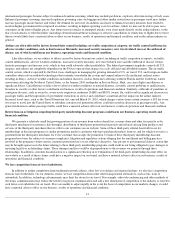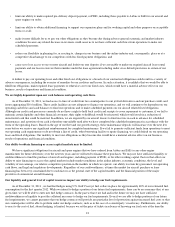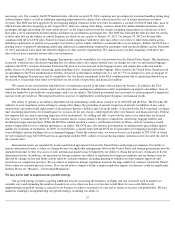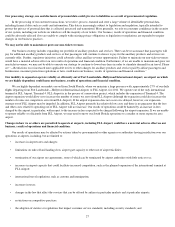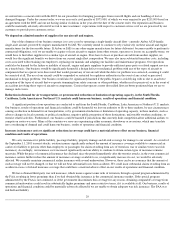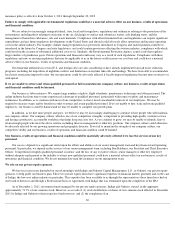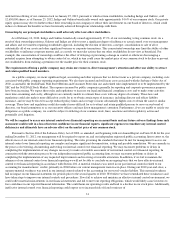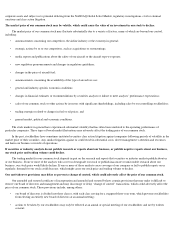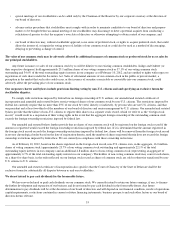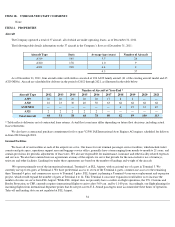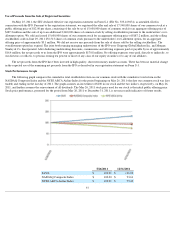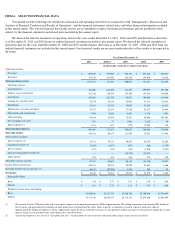Spirit Airlines 2011 Annual Report Download - page 35
Download and view the complete annual report
Please find page 35 of the 2011 Spirit Airlines annual report below. You can navigate through the pages in the report by either clicking on the pages listed below, or by using the keyword search tool below to find specific information within the annual report.
insurance policy is effective from October 1, 2011 through September 30, 2012.
Failure to comply with applicable environmental regulations could have a material adverse effect on our business, results of operations
and financial condition.
We are subject to increasingly stringent federal, state, local and foreign laws, regulations and ordinances relating to the protection of the
environment, including those relating to emissions to the air, discharges to surface and subsurface waters, safe drinking water, and the
management of hazardous substances, oils and waste materials. Compliance with all environmental laws and regulations can require significant
expenditures and any future regulatory developments in the United States and abroad could adversely affect operations and increase operating
costs in the airline industry. For example, climate change legislation was previously introduced in Congress and such legislation could be re-
introduced in the future by Congress and state legislatures, and could contain provisions affecting the aviation industry, compliance with which
could result in the creation of substantial additional costs to us. Similarly, the Environmental Protection Agency issued a rule that regulates
larger emitters of greenhouse gases. Future operations and financial results may vary as a result of such regulations. Compliance with these
regulations and new or existing regulations that may be applicable to us in the future could increase our cost base and could have a material
adverse effect on our business, results of operations and financial condition.
Governmental authorities in several U.S. and foreign cities are also considering or have already implemented aircraft noise reduction
programs, including the imposition of nighttime curfews and limitations on daytime take-offs and landings. We have been able to accommodate
local noise restrictions imposed to date, but our operations could be adversely affected if locally-imposed regulations become more restrictive or
widespread.
If we are unable to attract and retain qualified personnel or fail to maintain our company culture, our business, results of operations
and financial condition could be harmed.
Our business is labor intensive. We require large numbers of pilots, flight attendants, maintenance technicians and other personnel. The
airline industry has from time to time experienced a shortage of qualified personnel, particularly with respect to pilots and maintenance
technicians. In addition, as is common with most of our competitors, we have faced considerable turnover of our employees. We may be
required to increase wages and/or benefits in order to attract and retain qualified personnel. If we are unable to hire, train and retain qualified
employees, our business could be harmed and we may be unable to complete our growth plans.
In addition, as we hire more people and grow, we believe it may be increasingly challenging to continue to hire people who will maintain
our company culture. Our company culture, which is one of our competitive strengths, is important to providing high-quality customer service
and having a productive, accountable workforce that helps keep our costs low. As we continue to grow, we may be unable to identify, hire or
retain enough people who meet the above criteria, including those in management or other key positions. Our company culture could otherwise
be adversely affected by our growing operations and geographic diversity. If we fail to maintain the strength of our company culture, our
competitive ability and our business, results of operations and financial condition could be harmed.
Our business, results of operations and financial condition could be materially adversely affected if we lose the services of our key
personnel.
Our success depends to a significant extent upon the efforts and abilities of our senior management team and key financial and operating
personnel. In particular, we depend on the services of our senior management team, including Ben Baldanza, our President and Chief Executive
Officer. Competition for highly qualified personnel is intense, and the loss of any executive officer, senior manager or other key employee
without adequate replacement or the inability to attract new qualified personnel could have a material adverse effect on our business, results of
operations and financial condition. We do not maintain key-man life insurance on our management team.
We rely on our private equity sponsors.
We have in recent years depended on our relationships with Indigo and Oaktree Capital Management, L.P., or Oaktree, our private equity
sponsors, to help guide our business plan. These two private equity firms have significant expertise in financial matters generally and, in the case
of Indigo, the low-cost airline industry in particular. This expertise has been available to us through the representatives these firms have had on
our board of directors and through a Professional Services Agreement with Indigo that was terminated upon the completion of the IPO.
As of December 1, 2011, investment funds managed by our private equity sponsors, Indigo and Oaktree, owned, in the aggregate,
approximately 71.7% of our common stock. However, as a result of (1) stock distributions of shares of our common stock effected in December
2011 by Indigo and Oaktree to their respective fund investors, and (2) the completion of an
30


